
The Senate confirmed U.S. Solicitor General Elena Kagan on Thursday as the 112th justice to the Supreme Court, making her the fourth woman to sit on the court.
On a vote of 63 to 37, Kagan, who will succeed retired justice John Paul Stevens, became the second member President Obama has placed on the high court. One year ago, Sonia Sotomayor won confirmation as the court's first Latina.
Some Democrats have said they hope that the lifetime appointment of Kagan, a consensus-building liberal, will nudge the court slightly to the left.
Her confirmation is considered unlikely to immediately shift the court's ideology, however. Although she is expected to fit comfortably within the liberal wing of the court, she does not seem to be as liberal as Stevens was during his final years on the bench.
2010-08-09
Posted in Women In the News

On a Friday afternoon in July 2010, Missouri State University held its summer commencement. There were 527 graduates in all, but one drew the attention of everyone.
Mary Jean Price Walls received the first ever honorary undergraduate degree given by the university. In the fall of 1950, Walls applied to what was then known as Southwest Missouri State College.
She was the first African American to apply, however, her application was denied because the school was not desegregated until 1954.
The honorary degree is given to honor the degree she was not allowed to pursue 60 years ago.
2010-08-03
Posted in Women In the News

Kampala — Uganda has been praised for banning female genital mutilation (FGM), with a call to other African countries where the practice still exists to follow suit.
Addressing the First Ladies' forum on HIV/AIDS at Speke resort Munyonyo yesterday, the African Union (AU) commissioner for social affairs, Bience Gawanas, said the practice humiliated women.
"AU decided that there should be no more declarations, no more resolutions concerning women's lives and dignity because it is time for action. That's why we applaud our host Uganda, who passed a law against female genital mutilation," she said.
Gawanas added that the practice should have been abolished long time ago and urged other countries that have not banned it to do so quickly.
2010-07-30
Posted in Women In the News

A YouTube search for “female driver” yields more than 3,000 results: You can watch women drivers shearing off gas pumps, veering into swimming pools and destroying every car in the vicinity while attempting to parallel park. Another woman manages to roll her car on to its roof pulling into a driveway.
A similar search, this time for “male driver,” pulls up just 348 videos – about one-tenth as many. Why are there so few videos about bad male drivers – and so many featuring women? Do women actually produce more camera-worthy driving disasters? Are women worse drivers than men?
According to a new Harris-Decima poll, Canadians think the answer is yes. When asked who was better at driving, 36 per cent of those polled said men were. A lower number (29 per cent) thought women were the best drivers.
The poll also suggests that age-old prejudices live on, largely due to the male tendency to consider himself better equipped for the road: Some 48 per cent of the men polled said they were superior drivers – but only 25 per cent of the women respondents said they were better.
2010-07-30
Posted in Women In the News

Having great friends, a strong marriage and children who love you may be just as important to living a long life as something like quitting smoking, a new study finds.
Researchers from Brigham Young University have found that people who have lots of close relationships have better odds of living a long life than those who are lonely.
The study, which appears in the July issue of PLoS Medicine, found that strong social connections improve our odds of survival by 50 per cent. In fact, the protective effect of strong social relationships exceeds the influence of other early-death risk factors, such as not exercising and obesity.
Low social interaction, on the other hand, is equivalent to smoking 15 cigarettes a day or being an alcoholic.
2010-07-30
Posted in Women In the News
 The Senate confirmed U.S. Solicitor General Elena Kagan on Thursday as the 112th justice to the Supreme Court, making her the fourth woman to sit on the court.
The Senate confirmed U.S. Solicitor General Elena Kagan on Thursday as the 112th justice to the Supreme Court, making her the fourth woman to sit on the court. On a Friday afternoon in July 2010, Missouri State University held its summer commencement. There were 527 graduates in all, but one drew the attention of everyone.
On a Friday afternoon in July 2010, Missouri State University held its summer commencement. There were 527 graduates in all, but one drew the attention of everyone. Kampala — Uganda has been praised for banning female genital mutilation (FGM), with a call to other African countries where the practice still exists to follow suit.
Kampala — Uganda has been praised for banning female genital mutilation (FGM), with a call to other African countries where the practice still exists to follow suit. A YouTube search for “female driver” yields more than 3,000 results: You can watch women drivers shearing off gas pumps, veering into swimming pools and destroying every car in the vicinity while attempting to parallel park. Another woman manages to roll her car on to its roof pulling into a driveway.
A YouTube search for “female driver” yields more than 3,000 results: You can watch women drivers shearing off gas pumps, veering into swimming pools and destroying every car in the vicinity while attempting to parallel park. Another woman manages to roll her car on to its roof pulling into a driveway. Having great friends, a strong marriage and children who love you may be just as important to living a long life as something like quitting smoking, a new study finds.
Having great friends, a strong marriage and children who love you may be just as important to living a long life as something like quitting smoking, a new study finds.